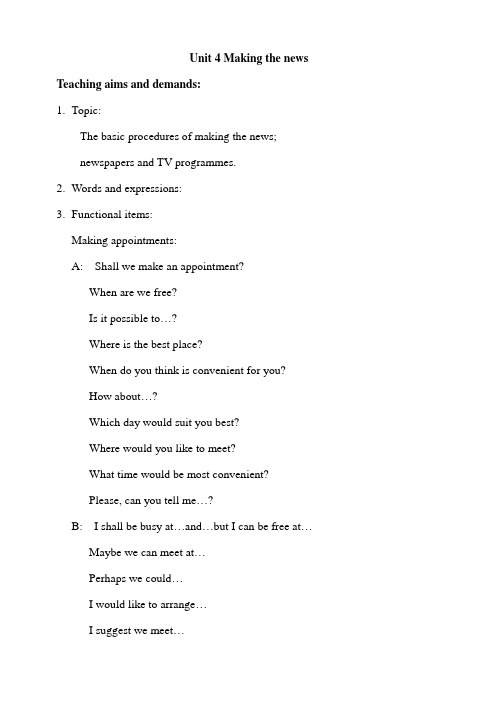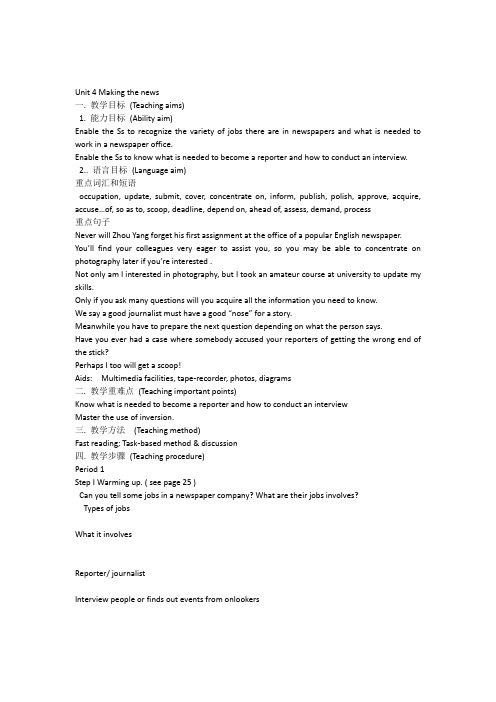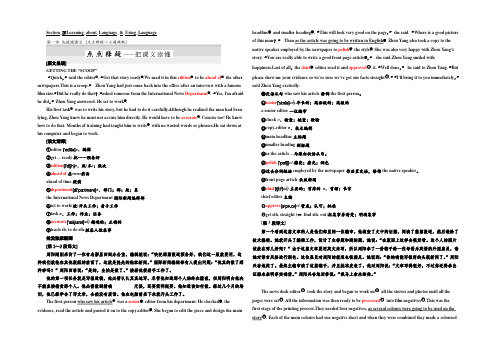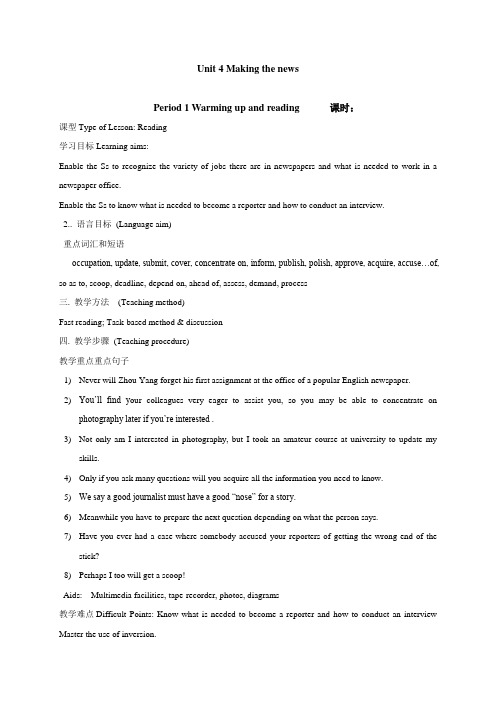人教版必修五第四单元单词教学案
人教新课标高中英语必修5Unit4教案2

Unit 4 Making the news Teaching aims and demands:1.Topic:The basic procedures of making the news;newspapers and TV programmes.2.Words and expressions:3.Functional items:Making appointments:A: Shall we make an appointment?When are we free?Is it possible to…?Where is the best place?When do you think is convenient for you?How about…?Which day would suit you best?Where would you like to meet?What time would be most convenient?Please, can you tell me…?B: I shall be busy at…and…but I can be free at…Maybe we can meet at…Perhaps we could…I would like to arrange…I suggest we meet…I maybe able to see you at…That will/won’t be convenient because…I can/cannot do that because…I look forward to seeing you.4.Grammar use: InversionNever will Zhou Yang forget his assignment at the office of China Daily.Only when you have seen what he or she does, can you cover a story by yourself.Not only am I interested in photograph, but…Only if you ask many different questions will you acquire all the information you need to know.Teaching procedures:The 1st period (Reading)Step One1.Present the following to the students:Journalist editor deputy editor desk editor reporter cartoonist critic sub-editor foreign correspondent2.Ask the following questions:1)Which two words mean the same? (journalist/ reporter)2)Who gives opinions on plays and books? (critic)3)Who reports from abroad? (foreign correspondent)4)Who decides on the content of the newspaper? (writer and chief editor)5)Who writes news stories? (reporter and journalist)6)Who makes corrections to articles and design? (sub-editor)7)Who designs comic drawing with captions? (cartoonist)8)Who is in charge of the newspaper when the boss is away? (deputyeditor)3.Get the students to fill in the chart in pairs on Page 25.Step Two1.Ask the following questions:1)What level of education should a good news reporter have?2)Does work experience play an important role in making the news?3)What do you think are good communication skills?4)Is being curious and active important? Why/ why not?5)Working hard or working smart, which would you prefer?6)Enthusiasm for the job is the key to success, do you agree? Why/ whynot?2.Put the students into pairs to discuss these questions and tick the boxes onPage 25. Let them evaluate them together and arrive at some that are very important and others that are important qualities. They may also add their own suggestions for the last two spaces.3.Put all the qualities on the board in a list and alongside them put twocolumns: one for very important and one for important qualities. See chart below.4.Ask one from each other to give their findings on very important andimportant qualities. Put a tick for each one in the correct column.Step Three1.Teaching new words and structuresRemember to encourage students to pre-read the text and try to work out any unknown words or structures. Remind them to look carefully at the words before of after the unknown word. Use these to guess the unknown word. Only then should they look up the new word in the dictionary. Any problems they can check with you.2.Understanding ideasThere are two important ideas for the students to understand:1)what is needed to become a reporter (see comprehending )2)how to conduct an interview.To conduct an interview the students must look at the kinds of questions that Zhou Yang asks Hu Xin.3.Intensive reading:1)Encourage the students to find two formal sentences on their own andunderline them. Discuss their choices and ask them to justify them..2)Encourage the students to find two informal sentences on their own andunderline them. Discuss their choices and ask them to justify them.3)What sort of language do students think is appropriate to speak to theboss? Does Zhou Yang speak appropriately to his boss? Give your reasons.Step Four1.Finish the exercises in Comprehending.2.Ask the students to discuss the following questions:1)What is news?2)What is good news?3)What is bad news?4)What will make the news?5)What is a scoop?Step FiveGet the students to finish the Workbook exercises.The 2nd period (Learning about language)Step One: RevisionGet students to retell the story using their own words.Step Two: Language points1. concentrate on= focus attention on2of special interest= very interesting3accuse sb of sthinform sb of sthrob sb of sthcure sb of sthwarn sb of sthStep Three: discovering useful words and expressions1.Read the passage again, find the idiomatic expressions to fill in the chart onPage 28. Add one more of their own.plete Sentence B using a word or phrase from the reading passagewhich has the opposite meaning to the words underlined in Sentence A.3.Learning word formation: n.+ -al →adj.The 3rd Period: Grammar useInversion: Refer to pages 90-91 to find out what “inversion ” is like.Step One:Find three examples of inversion in the reading passageStep Two:Rewrite the sentences using normal word order:1)I did not know how to use that recorder. Neither did he.2)Only when did I begin my work on designing a new bridge.3)Not only was there a Christmas tree, but also exciting presents under it.4)“Is everything ready yet?” asked Hu Xin to the photographer.Step Three:Rewrite the sentences using inversion with exercise 3 on Page 30.Step Four:Finish the sentences in exercise 4.Step Five: PracticeFinish the Workbook exercises on Page 64.The 4th Period Using languageStep One: RevisionCheck the Workbook exercise 1 & 2 on page 64.Step Two: ReadingThis reading is about the process of by which the reporter’s story is printed in the newspaper. As this is quite a complicated process there are several jobs and vocabulary specific to a newspaper that needs comment.1)the edition2)international news department3)sub-editor and chief editor4)headline5)polish the style6)printing processStep Three: Practice1.Get students to read the passage to work out the writing and printingprocess for an article. Then complete the chart on Page 31.2.imagine what the film star has done. Discuss how we might try to lieabout it. Then pretend you are Zhou Yang and write an article for the newspaper.The 5th Period: Listening and speakingStep One: Pre-listeningGet students to review the useful expressions of offering help.1.)I would like to…2.)Can I help you?3.)Is it possible to…4.)Thank you so much.Step Two: Listening1.Ss read the statement of part 1,on page 31.2.Ss listen to the tape and make their choice.3.Ss listen again and answer the questions of part 2, on page 32.Step Three: Speaking1. Practice in pairs making appointments. One of the students needs to have his picture taken for a magazine. The other is the photographer who wants to take the picture because he/ she won’t be free in the afternoon. See how well they can arrange the meeting.2. Get one or two pairs to present their dialogue in front of the class.The 6th Period: Summing up1.This is an opportunity to think about what you have learned, but also whatyou need to think more about.2.Finish the workbook exercises.3.4.。
人教版英语必修五unit4教案

Unit 4 Making the news一. 教学目标(Teaching aims)1. 能力目标(Ability aim)Enable the Ss to recognize the variety of jobs there are in newspapers and what is needed to work in a newspaper office.Enable the Ss to know what is needed to become a reporter and how to conduct an interview. 2.. 语言目标(Language aim)重点词汇和短语occupation, update, submit, cover, concentrate on, inform, publish, polish, approve, acquire, accuse…of, so as to, scoop, deadline, depend on, ahead of, assess, demand, process重点句子Never will Zhou Yang forget his first assignment at the office of a popular English newspaper. You’ll find your colleagues very eager to assist you, so you may be able to concentrate on photography later if you’re interested .Not only am I interested in photography, but I took an amateur course at university to update my skills.Only if you ask many questions will you acquire all the information you need to know.We say a good journalist must have a good “nose” for a story.Meanwhile you have to prepare the next question depending on what the person says.Have you ever had a case where somebody accused your reporters of getting the wrong end of the stick?Perhaps I too will get a scoop!Aids: Multimedia facilities, tape-recorder, photos, diagrams二. 教学重难点(Teaching important points)Know what is needed to become a reporter and how to conduct an interviewMaster the use of inversion.三. 教学方法(Teaching method)Fast reading; Task-based method & discussion四. 教学步骤(Teaching procedure)Period 1Step I Warming up. ( see page 25 )Can you tell some jobs in a newspaper company? What are their jobs involves?Types of jobsWhat it involvesReporter/ journalistInterview people or finds out events from onlookersPhotographerTakes photos of important people or eventsEditorMakes sure the writing is clear, concise and accurate, check factsDesignerLays out the articles and photographsPrinterPrints the newspaperTeaching suggestions: rearrange the order of the types of jobs a newspaper has and what they involveAnd ask the students to do the matches. Then ask them to copy what’s on the screen to their books.At the same time deal with the new words:occupation and journalist and the expression: suppose you were…occupation =a job or professionTeaching is my occupation. 教书是我的职业.。
必修五Unit4教案设计

必修五Unit4教案设计一、教学内容本课教学内容为人教版高中英语必修五Unit 4 Making Plans。
本节课主要讨论未来的职业规划,通过听、说、读、写等多种方式提高学生的语言运用能力。
本节课包括三个部分:热身活动、主体活动和复习。
1. 热身活动:谈论未来的计划和梦想。
2. 主体活动:学习如何制定未来的职业规划,并通过任务型活动进行实践。
3. 复习:复习本单元的重点词汇和句型。
二、教学目标1. 学生能够掌握并运用本节课的重点词汇和句型,如“make a plan for”,“What do you think you’ll be doing in five years’ time?”等。
2. 学生能够听懂、会说、会读、会写关于未来职业规划的短文。
3. 学生能够提高自己的合作能力和交际能力。
三、教学难点与重点重点:本节课的重点是让学生能够运用所学的词汇和句型进行有效的交流,讨论未来的职业规划。
难点:如何引导学生正确使用情态动词进行未来的预测,如“I think you’ll be”,“I hope you’ll be”等。
四、教具与学具准备教具:多媒体课件、录音机、磁带。
学具:课本、练习册、铅笔、橡皮。
五、教学过程1. 热身活动(5分钟)教师提问学生关于未来的计划和梦想,引导学生进行自由的交流,如:“What do you want to be when you grow up?”,“What are your plans for the future?”等。
2. 主体活动(20分钟)(1)教师引导学生学习本节课的重点词汇和句型,如“make a plan for”,“What do you think you’ll be doing in five years’ time?”等。
(2)学生进行小组活动,根据所学的词汇和句型,制定一个关于未来职业规划的短文。
(3)教师选取几个小组的短文进行展示,并让学生进行评价和修改。
2021-2022学年高中英语人教版必修五教学案:Unit 4 Section Ⅳ Word版含答案

Section_ⅣLearning_about_Language_&_Using_Language[原文呈现]GETTING THE “SCOOP”“Quick,”said the editor①.“Get that story ready②.We need it in this edition③to be ahead of④the other newspapers.This is a scoop.”Zhou Yang had just come back into the office after an interview with a famous film star.“Did he really do that?”asked someone from the International News Department⑤. “Yes, I'm afraid he did,”Zhou Yang answered. He set to work⑥.His first task⑦was to write his story, but he had to do it carefully.Although he realized the man had been lying, Zhou Yang knew he must not accuse him directly. He would have to be accurate⑧. Concise too! He knew how to do that. Months of training had taught him to write⑨with no wasted words or phrases.He sat down at his computer and began to work.[读文清障]①editor ['edItə]n.编辑②get ... ready把……预备好③edition[I'dIʃn]n.版(本);版次④ahead of在……前面ahead of time提前⑤department[dI'pɑːtmənt]n.部门;部;处;系the International News Department国际新闻编辑部⑥set to work(使)开头工作;着手工作⑦task n.工作;作业;任务⑧accurate['ækjʊrət]adj.精确的;正确的⑨teach sb. to do sth.教某人做某事抢发独家新闻[第1~2段译文]周阳刚刚采访了一位有名影星回到办公室,编辑就说:“快把那篇报道预备好,我们这一版就要用,这样我们就抢在其他报纸的前面了,这就是抢先的独家新闻。
人教版高中英语必修五教案:Unit 4 Making the news

Unit 4 Making the newsPeriod 1 Warming up and reading 课时:课型Type of Lesson: Reading学习目标Learning aims:Enable the Ss to recognize the variety of jobs there are in newspapers and what is needed to work in a newspaper office.Enable the Ss to know what is needed to become a reporter and how to conduct an interview.2.. 语言目标(Language aim)重点词汇和短语occupation, update, submit, cover, concentrate on, inform, publish, polish, approve, acquire, accuse…of, so as to, scoop, deadline, depend on, ahead of, assess, demand, process三. 教学方法(Teaching method)Fast reading; Task-based method & discussion四. 教学步骤(Teaching procedure)教学重点重点句子1)Never will Zhou Yang forget his first assignment at the office of a popular English newspaper.2)You’ll find y our colleagues very eager to assist you, so you may be able to concentrate onphotography later if you’re interested .3)Not only am I interested in photography, but I took an amateur course at university to update myskills.4)Only if you ask many questions will you acquire all the information you need to know.5)We say a good journalist must have a good “nose” for a story.6)Meanwhile you have to prepare the next question depending on what the person says.7)Have you ever had a case where somebody accused your reporters of getting the wrong end of thestick?8)Perhaps I too will get a scoop!Aids: Multimedia facilities, tape-recorder, photos, diagrams教学难点Difficult Points: Know what is needed to become a reporter and how to conduct an interview Master the use of inversion.教学反思Teaching Re-thinking:家庭作业Homework:教学过程Teaching Procedures:一. 教学目标(Teaching aims)1. 能力目标(Ability aim)Period 1Step I Warming up. ( see page 25 )Can you tell some jobs in a newspaper company? What are their jobs involves?Teaching suggestions: rearrange the order of the types of jobs a newspaper has and what they involve And ask the students to do the matches. Then ask them to copy what’s on the screen to their books. At the same time deal with the new words:occupation and journalist and the expression: suppose you were…occupation =a job or professionTeaching is my occupation. 教书是我的职业.。
人教英语必修五unit4教案.docx

Unit 4 Making the news一.教学目 (Teaching aims)1.能力目 (Ability aim)Enable the Ss to recognize the variety of jobs there are in newspapers and whatis needed to work in a newspaper office.Enable the Ss to know what is needed to become a reporter and how to conduct aninterview.2..言目 (Language aim)重点和短occupation,update,submit,cover,concentrate on,inform,publish,polish, approve,acquire, accuse⋯of,so as to,scoop,deadline,depend on,ahead of, assess, demand, process重点句子Never will Zhou Yang forget his first assignment at the office of a popular English newspaper.You’ll find your colleagues very eager to assist you, so you may be able toconcentrate on photography later if you’re interested .Not only am I interested in photography, but I took an amateur course at universityto update my skills.Only if you ask many questions will you acquire all the information you need to know. We say a good journalist must have a good“nose” for a story.Meanwhile you have to prepare the next question depending on what the person says. Have you ever had a case where somebody accused your reporters of getting the wrong end of the stick?Perhaps I too will get a scoop!Aids: Multimedia facilities, tape-recorder, photos, diagrams二.教学重点 (Teaching important points)Know what is needed to become a reporter and how to conduct aninterview Master the use of inversion.三.教学方法 (Teaching method)Fast reading; Task-based method & discussion四.教学步 (Teaching procedure)Period 1Step I Warming up. ( see page 25 )Can you tell some jobs in a newspaper company? What are their jobs involves?Types of jobsWhat it involvesReporter/ journalistInterview people or finds out events from onlookersPhotographerTakes photos of important people or eventsEditorMakes sure the writing is clear, concise and accurate, check factsDesignerLays out the articles and photographsPrinterPrints the newspaperTeaching suggestions: rearrange the order of the types of jobs a newspaper has and what they involveAnd ask the students to do the matches. Then ask them to copy what’s on the screen to their books.At the same time deal with the new words:occupation and journalist and the expression: suppose you were⋯occupation =a job or professionTeaching is my occupation.教是我的 . 。
【免费】高中英语必修五教学设计:Unit4-人教版

Unit 4 Making the newsReading: My First Work AssignmentTeaching aims:1.Enable the students to recognize the variety of jobs there are in newspapers andwhat is needed to work in a newspaper office.2.Enable the students to know what is needed to become a reporter and how toconduct an interview.3.Train the students’ reading ability of skimming and scanning.Teaching important and difficult points:1.Help the students learn about the qualities needed to be a good reporter.2.Encourage the students to make clear how to get an accurate story and how toprotect a story from accusation.Teaching preparations:Find some introductions about famous persons and somevideo materials of interview through the internet. Prepare amicrophone for the students to do the interview.Teaching procedures:Ⅰ. Lead-inT: Today we are going to learn a lesson about “making the news”. Now let’s enjoy a video. (Tow minutes later) From the video, we know a woman is conductingan interview with George Bush, former president of the USA. Do you know who sheis? And what’s her job?Ss: She is Yang Lan. And she is a journalist.T: good. She is a most famous women reporter in our country who hasinterviewed a great many famous people all over the world. Today we’ll learn a passage related to this job and the title is “My First Work Assignment”.Before reading, let’s predict: why the new journalist think it “unforgettable Encourage students to find out the answer: he got many useful information about howto be a good journalist and how to cover a story.。
人教版高中英语Book 5 Unit 4 reading Getting the scoop教学设计

目标
知识技能目标
1.通过阅读,能够从篇章中获取主要信息,明确文章的写作结构并学会用自己的语言阐明观点。
2.通过小组合作学习,使学生能够根据短文内容准确地复述课文。
学习策略目标
提高学生在自主学习(Self-study)、小组合作学习(Group cooperation learning)和探究性学习(Inquiry learning)的学习策略意识。
教学
对象
分析
对于山区的高二学生而言,虽然在平时的英语学习中掌握了不少英语词汇,但由于缺乏一定的语言环境,使得他们很少有机会开口说英语。为此,在这节课中我把阅读训练和口语训练微妙地结合起来,让学生在理解课文的基础上进一步学习,将新知识融入到原有的知识结构中,通过对课文内容的复述将课文内容用另外一种方式表达出来。这种方法有利于提高学生的语言组织能力和创新能力,对提高学生的口头表达能力有一定的帮助。
1.Answer six questions shown on the screen.
2.Give the students 10 minutes to prepare their retelling in their small groups.
3.Ask three students to retell the passage.
情感态度目标
1.通过本文的学习,帮助学生更好的提高阅读理解能力。
2.通过小组合作学习,使学生面对新的学习项目时,敢于激活相关知识,敢于用英语表达自己,使学生对英语口语产生兴趣。
3.通过小组复述课文,加深对课文内容的理解,培养学生更高水平的交流技巧。
教学重难点分析及解决办法
教学重点
阅读,讨论,复述课文三个环节是本课时的重点,通过读的输入,转化成说的输出,最终实现语言综合运用能力的提高。
- 1、下载文档前请自行甄别文档内容的完整性,平台不提供额外的编辑、内容补充、找答案等附加服务。
- 2、"仅部分预览"的文档,不可在线预览部分如存在完整性等问题,可反馈申请退款(可完整预览的文档不适用该条件!)。
- 3、如文档侵犯您的权益,请联系客服反馈,我们会尽快为您处理(人工客服工作时间:9:00-18:30)。
(1)He ran quickly ___________catch the last bus. 他跑得很快以便赶上末班车。 (2)We turned on the light __________/_________________we might see what it was. =We turned on the light _____________ see what it was. 我们把灯打开,以便看看它是什么。
高二英语第五模块第四单元单词教学案 制作人:李洪燕 审核人:李洪燕 使用时间: 2014-10-29
级部签字 编号: 12
—课前预习案 —— 1.She broke that beautiful vase d_____________, which made me quite angry. 2. He did steal the famous painting, so he is g__________. 3. They’ ll arrive in ten minutes. M____________ we’ ll have some coffee. 4. She can c_______________ on her study for a long time. 5. The reporter went out with a p_______________ (专业的)photographer. 6.Mike’s car broke down because of a serious t__________ problem. ——课中探究案—— 一、检查反馈,导入新课。 Check the pronunciation of the new words. 二、目标定位,确定重点。 1. 会读本单元单词,力求读得更流利。 2. 记住本单元的重点单词并能用其造句。 3. 能运用这些词汇解决相关练习题。 三、自主探究,教师点拨。 【单词学习】
1.assist vi. & vt. & n.帮助;援助;协助 assistance n.援助;帮助;补助 assistant n.助手;助理 adj. 辅助的;助理的 come to sb.‟s assistance 帮助某人 with the assistance of 在……的帮助下 assist sb. with sth. 帮助某人做某事 assist sb. in doing sth./to do sth. 帮助某人做某事 assist at/in sth. 参加某事物 (1)The students ________________________ doing the experiment. 学生们协助教授做实验。 (2)We all ____________ mending the roof. 我们都帮助修理屋顶。 (3)We asked him to _____________designing a new bridge. 我们请他帮助我们设计一座新桥。 2.concentrate vt. 集中;全神贯注→concentration n. 专心;专注 concentrate (sth.) on (doing) sth. 集中于;专心于…… concentrate one„s attention/efforts/thoughts on... 把注意力/努力/思想集中到…… (1)We should _______all our effort __ improving education. 我们应该致力于改进教育工作。 (2)He _______________ the study of English. 他把重点放在英语学习上。 拓展:focus/fix one„s attention on... 集中注意力于…… put one‟s mind/heart in (into) 专心于……
高二英语 学案
ቤተ መጻሕፍቲ ባይዱ
be absorbed in... 一心一意于……
1 (二级部)
apply oneself/one„s mind to... 专心于…… 3.acquire vt. 获得,取得,学到
pay attention to 专心,注意……
注:以上短语中 in, to 都是介词,后接名词或动名词。 (1)I managed to __________________ for the concert. 我设法弄到了两张音乐会的票。 (2)She ________________________ French. 她学会了法语。 4。inform vt. 告知;通知→informed adj. 了解情况的;见识广的 inform sb. of/about sth. 告知某人某事 inform sb. (that) ... 通知某人 keep sb. informed 使某人随时了解最新情况 (1)Please _________________any change of address as soon as possible. 地址如有变更请尽快通知我们。 (2)We regret to ______ you ______ your application has been rejected. 我们很遗憾地通知你,你的申请未被接受。 (3)Please ______ me fully ____________ any developments. 事态如有发展,请向我提供详情。 5.case n. 情况;病例;案例 in case of... 假使……,万一…… in case 以防,万一 in any case 无论如何,总之 in this/that case 如果这样/那样的话,在这种/那种情况下 in no case 决不(放于句首,句子用半倒装) in the case of 就……来说 as is often the case 这是常有的事 as the case may/might be 看情况,视情况而定 (1)__________________ people have had to wait several weeks for an appointement. 在某些情况下,人们必须等上好几周才能得到约见。 (2)____________ will be heard next week. 此案下周审理。 (3)_____________ fire, call 119. 万一发生火灾,就打 119。 (4)You„d better take the keys ____________ I‟m out. 你最好带上钥匙,以防我不在家。 6.accuse vt. 控告;谴责 accuse sb. of sth. =charge sb. with sth. 因某事而控告/谴责某人 accuse sb. as... 指控某人为…… accuse sb. for sth. 为某事指责某人 (1)My teacher is always __________ me ______ carelessness. 我的老师总是指责我粗枝大叶。 (2)Mary __________________ an accomplice. 玛丽被指控为同谋犯。 (3)Man often _________ nature ______ his own misfortunes. 人类常把自身的不幸归罪于天。 拓展:与 accuse sb. of sth. 结构相似的有: rob sb. of sth. 抢劫某人的某物 warn sb. of sth. 警告某人某事 cure sb. of sth 治愈某人某病 rid sb. of sth. 使某人摆脱某事 remind sb. of sth. 提醒某人某物 suspect sb. of sth 怀疑。 。 。 inform sb. of sth. 通知某人某事 convince sb. of sth 使某人相信某事 7.demand n.要求,需要 vt. 强烈要求 demand sth. 要求某物 demand sth. of/from sb. 向某人要求某物 demand to do 要求干…… demand that... 要求……(从句用虚拟语气,即“should+动词原形”,should 可省略) be in(great) demand( 迫切)需求 satisfy one‟s demands 满足某人的需求 (1)There have been ____________ the prime minister to resign. 已有许多人要求首相辞职。
(1) Success ____________ your effort and ability. 成功与否得看你的努力和能力。 (2) It all __________whether or not you are interested in it. 这完全看你对这事是不是有兴趣。 (3) You may ____________ them to be here early. 你可以指望他们会早来。 (4)-Is he coming?他来吗? -____________. He may not have time. 那要看情况。他不一定有时间。 10.so as to do sth. 以便,为了(做)……(引导目的状语,不放于句首) in order to 以便,为了……(引导目的状语,可放句首) so...as to 如此……以致(引导结果状语) in order that 为了,以便……(引导目的状语从句) so that 为了……;结果……(引导目的或结果状语从句) so...that... 如此……以至于(引导结果状语从句)
高二英语 学案 2 (二级部)
(2)After school Tom ___________ help _________ me. 放学后,汤姆要求我帮助。 (3)She demanded that I ______ everything to her about it. 她要求我把知道的整个事情都告诉她。 (4)Medical workers are in great _________ in that area. 那个地方非常需要医疗工作者。 (5)It‟s impossible to satisfy everyone‟s __________. 满足每个人的需求是不可能的。 8. approve v. 批准;同意→approval n. 批准;赞成;认可 approve sth. 核准(批准)某事 approve of sb./sth. 同意,赞成某人(某事) approve of sb.„s doing sth. 同意某人做某事 without approval 未经许可 with one‟s approval 经某人同意
